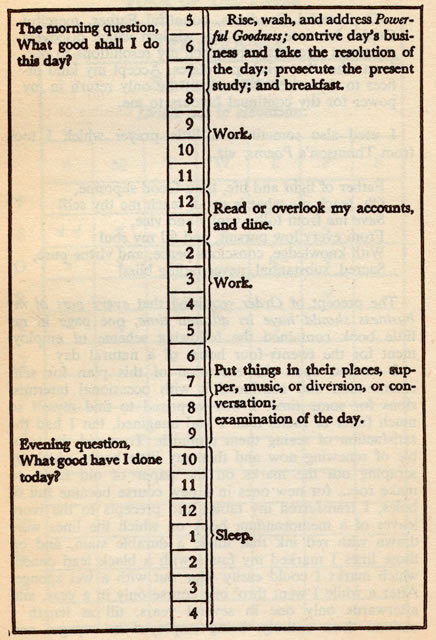It’s extremely easy to lose track of your goals without even realizing it.
Earlier this week, I talked about:
Even if you implement the to-dos in the above articles—even if your system is perfect—you’ll still falter along the way if you don’t take the time to review how you’re performing. I recently stumbled upon the daily schedule Benjamin Franklin kept:

Woah! The man was super reflective.
He started the day by asking himself, “What good will I do today?,” and ended the day by asking, “What good have I done today?”. He also took time at the beginning, middle, and end of each day for examining and reflecting on his work. One of the most prolific and accomplished people ever took the time to reflect, plan, and organize at least three times a day.
This astounds me.
I don’t know anyone who reflects this much. Honestly, no one. And I’m starting to think that’s a big part of the reason so few of us are feeling like we’re living lives at the awesome levels of productivity and achievement we desire. We aren’t measuring success. We aren’t reviewing results or assessing the data.
Every moment is a data point—and yet, none of us take time to track and reflect on those data points. Reviewing and goal setting are things people do at the very beginning and end of a year, and not so much in the bulk of the middle. The problem is we’re missing incredible opportunities to learn, iterate, and grow.
So, even if you’ve got a perfect system and you know exactly what you want to achieve, none of it really matters if you’re not reviewing your successes, failures, triggers, and habits frequently.
The remedy for that is the very powerful and important weekly review. I do my weekly review every Sunday, late in the afternoon (before I get too tired). Leo Babauta, a minimalist productivity guru, wrote a few fantastic (and simple) articles on weekly reviews:
Those two links above give you a pretty good overview of how to conduct a weekly review. The basic steps for my personal weekly review are as follows:
- Find a one-hour time block you can commit to each week. Babauta suggests a Monday or Friday, but I think weekends work best. Less stressful.
- Plan to not miss a single weekly review. It’ll throw you off for the week ahead, and before you know it, your goals will be a hot mess.
- Fill out my weekly review form. Here’s the one I created for myself:
The lines in grey comprise the bulk of the weekly review. Most of them are self-explanatory, but I’ll get into how I use Wunderlist later next week, because it’s important (Wunderlist is a to-do list manager, but I utilize mine very differently than a normal to-do list).
The reflection questions are also great. They are a way for you to stop and soak in how the past week was for you—along with setting intentions for the week ahead. You can tailor this weekly review to work for you, but this is a comprehensive template for you to work off of if you need a place to start.
The weekly review is one of my favorite times of the week. You’ll see a huge difference in how you spend your time when you actually review what you’ve done and plan for what you want to accomplish in the week ahead.
Happy weekly reviewing!



